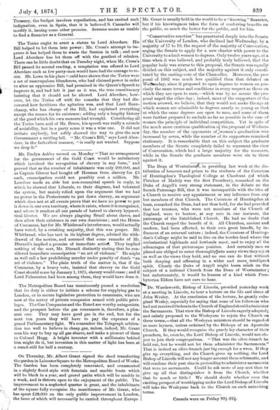The Dean of Westminste, in presiding last week at the
dis- tribution o? honours and prizes to the students of the Countess of Huntingdon's Theological College at Cheshunt (of which Fletcher of Madely was the first President), remarked on the Duke of Argyll's very strong statement, in the debate on the Scotch Patronage Bill, that it was incompatible with the idea of a Church to receive any appointment or any influence from any but members of that Church. The Countess of Huntingdon at least, remarked the Dean, had not thus held, for she had provided that her trustees, who were not members of the Church of England, were to bestow, at any rate in one instance, the patronage of the Established Church. He had no doubt that the Church reaped the benefit of it. All Churches, ancient and modern, had been affected, to their own great benefit, by in- fluences of an external nature ; indeed, the Countess of Hunting- don's College might be said to live on the border-land where the ecclesiastical highlands and lowlands meet, and to enjoy all the advantages of that picturesque position. And certainly men so placed are obliged to enter thoroughly/into many views they rejcct as well as the views they hold, and no one can do that without both denying and affirming in a wider and more', intelligent spirit. Clearly the Duke of Argyll might learn much on the subject of a national Church from the Dean of Westminster ; but unfortunately, it would be lessons of a kind which Pres- byterian Elders have not ears to hear.


































 Previous page
Previous page